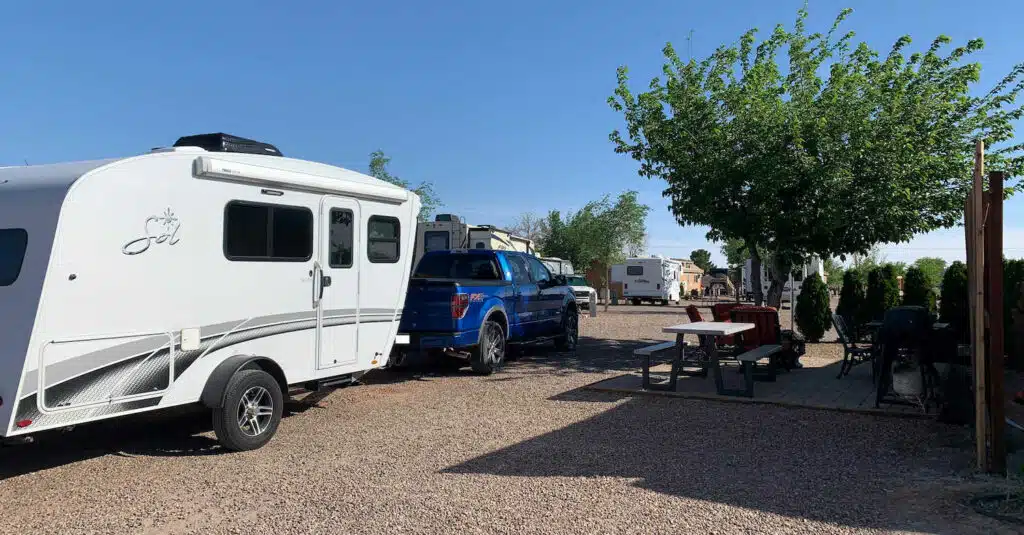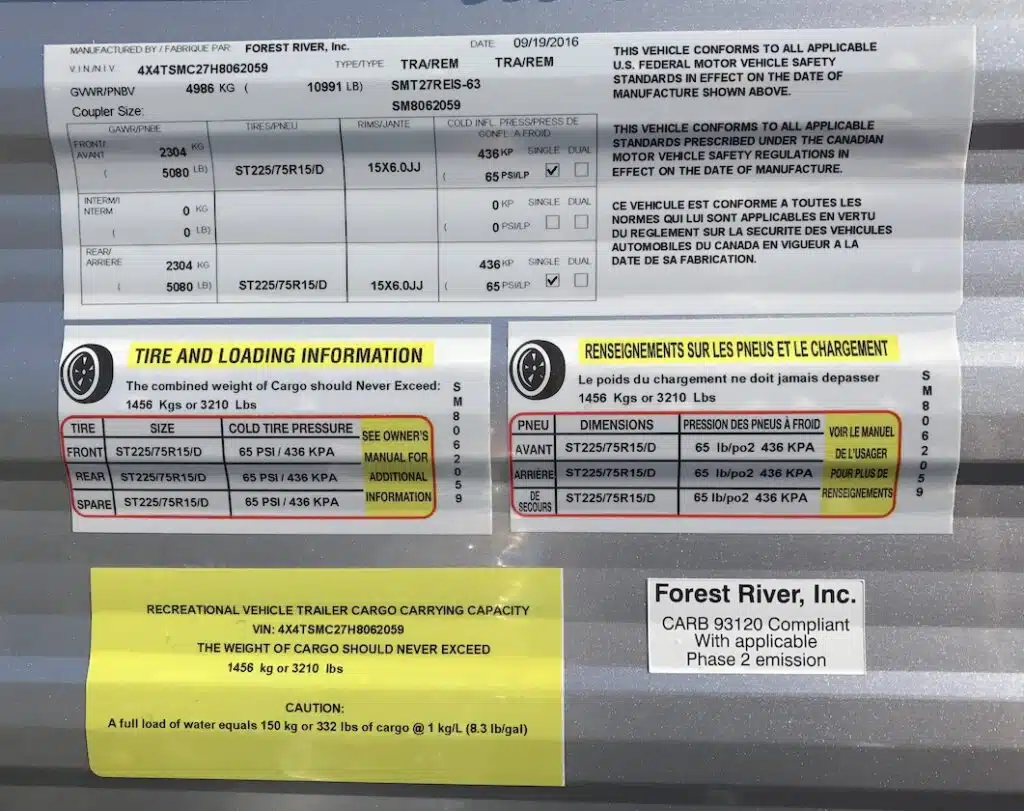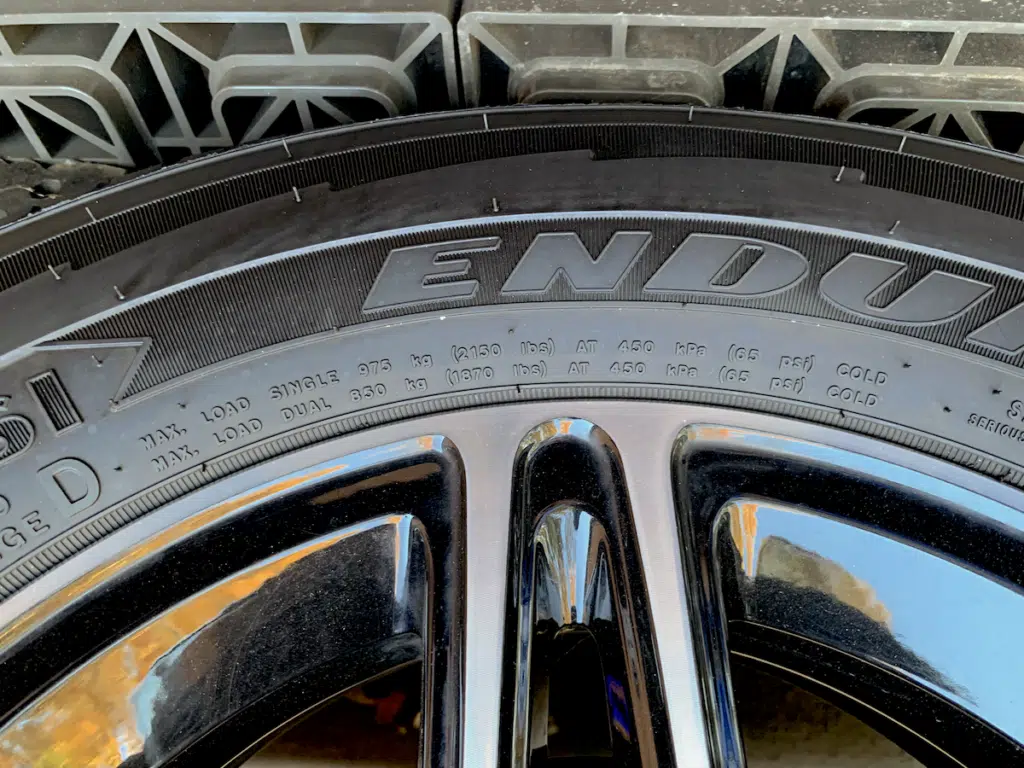Maintaining proper tire pressure for your RV and your tow vehicle is critical to the safety of your towing experience. However, proper tire inflation will also affect your average miles per gallon of fuel used when traveling.
Proper tire pressure on your RV, travel trailer, and tow vehicle will help prevent blowouts and other tire related issues that may occur. Confirming, prior to each travel day, you have the correct tire pressure for all the various tires on your setup is essential for you and your equipment’s safety when traveling.

Note: Ideal tire pressure for RV and tow vehicle tires will vary greatly depending on the type of tire and the suggested manufactures recommended operating tire pressure for each individual tire.
Every individual tire, regardless of the manufacturer or the model number of the tire, has its own unique operating tire pressure that has been engineered by the tire manufacturers for each specific tire. Because of this characteristics of tires, under inflation and over inflation of your tires can greatly affect a safe towing experiencing.
How to Determine the Proper RV Tire PSI?
All tire manufacturers adhere to an industry standard load rating chart for the various types of tires that may be used on RV’s and vehicles. This is a letter code that informs the purchaser how much weight a tire can carry and has been certified and engineered by the tire manufacturer for each specific tire.
RV manufacturers, when designing and engineering their various products, utilize this information to provide the specific tires that can accommodate the multitude of RV weight loads. This information is provided on your RV, typically on a sticker on the exterior. RV companies will determine the proper tire to utilize depending on the position and weight loading characteristics of each individual travel trailer or motorhome they produce.

Due to the broad range of RV model configurations and weights, the RV manufacturer will select the proper tire – using the industry standard load rating and tire pressure ratings – to use on their individual RV models. It is beholden of the consumer who purchases the RV to maintain the proper suggested tire pressure and load ratings for their RV’s tires.
✅ Click Here For Our RV Gear Gift Guide!
RV Tire Inflation Basics
Every tire will have the tire manufacturers recommended weight load and suggested safe operating tire pressure codes are stamped on the sidewall of every tire they produce. The owners of RVs should take note of their specific rig’s tire specifications and use that as a guide when properly maintaining and inflating their RV and tow vehicle’s tires.
Another important factor that will assist in maintaining the safe use of your RV’s and tow vehicle’s tires is the amount of weight you add to your RV and tow vehicle. Similar to cars and trucks, RVs – regardless if they are a travel trailer or a motorhome – have a maximum gross vehicle weight rating (GVWR). The maximum GVWR includes the base, empty weight of the RV plus the maximum added weight, such as fresh water, camping gear, grey and black tanks at capacity, etc.

It is also important to be aware of and follow the sidewall codes found on the tires for the purpose of achieving the correct tire pressure. The code indicates the country of origin, the manufacture date, and the maximum inflation pressure (cold).
Most RV manufacturers will suggest you inflate and maintain the max cold PSI listed on the sidewall of your RV tires. Validate your RV and tow vehicle tire pressures by spot checking with a quality tire pressure gauge prior to traveling (before the tires get warm from going down the road). As your tire temperature increases during use, the tire pressure will increase as well. Thus, why it is important to measure your tire pressure when the tire is cold or unused for that day.
One note on tire pressure to consider, altitude and ambient outside temperature can affect your RV’s and tow vehicle’s tire pressure. As the ambient, exterior temperature increases, the tire pressure will increase approximately 1 PSI for every 10 degrees Fahrenheit.
On the flip side, as your altitude increases, the tire pressure will decrease approximately 2 to 3 PSI for an increase of 5,000 feet above sea level. It is recommended you confirm and adjust your cold tire pressure before and after reaching your destination when ascending or descending in elevation.
Tire Pressure Monitoring Systems
A Tire Pressure Monitoring System or TPMS is a real-time monitoring device that provides current operating tire pressures for your RV and if desired your tow vehicle. TPMS devices can be placed on the tire’s fill nozzle in lieu of a cap.
The real-time tire pressure, and temperature (depending on the model of TPMS you purchase) is sent back to the driver wirelessly to a monitor device that is placed in the line of sight of the driver.
A tire pressure monitoring system can alert the driver of any sudden loss or increase in tire pressure for the tires that have the installed monitoring devices. This information can assist or alert the driver – if a sudden increase or decrease in tire pressure is experienced – of a potential impending tire blowout or major malfunction.
Many TPMS devices can monitor several tires, depending on the brand you purchase. With some brands having the ability to monitor up to 16 or more tires at one time. While an installed TPMS will not completely prevent tire malfunctions or failures, it can be an early warning device that may provide the driver
RV Trailer Tires Maintenance & Safety Tips
- Perform a visual tire inspection prior to, during, and after each travel day.
- Monitor and adjust your tire pressure accordingly.
- Set your tire pressure when the tires are cold.
- Inflate your (cold) RV tires to the maximum tire pressure noted on the sidewall.
- Keep your RV tires clean and free of any debris.
Why Do My Trailer Tires Keep Blowing Out?
Trailer tire blowouts are as a result a result of potentially one or several compounding factors. Included on your trailer sidewall codes are the load rating numbers that correspond to the manufacturers suggested max travel speed for that particular tire.
Here are some of the major factors that can singularly or together can cause RV tires to blowout:
- Tire pressure is too low for the load being carried
- Tire pressure is too high causing excessive strain on the tires while under load
- The trailer is being towed above the suggested speed rating for the tires
- Trailer tires are poorly made or may defective from the factory
- Tires have excessive wearing causing the rubber to be thinner than necessary
Why Do My Trailer Tires Have Uneven Wear?
Similar to the various reasons for trailer tire blowouts, there are several factors that may cause uneven wearing on your RV’s tires. It is important to have your RV maintained by a professional to avoid uneven tire wearing. Here are some of the factors than can cause uneven wear:
- Trailer tires and the trailer are overloaded
- Travel trailer axle could be bent or improperly installed
- The trailer suspension and lead springs may be damaged
- Tires may be improperly balanced on their respective rims
- Tire pressure is either below or above the suggested PSI
How Often Should I Replace My Trailer Tires?
Weather conditions, frequency of use, and trailer storage location are a few of the major factors that will determine when you should replace your trailer tires. Under normal, industry annual usage, trailer tires should be replaced every 5 to 6 six years.
However, where the trailer is being stored, if it is being stored inside or uncovered and exposed to the elements and the number of miles put on the trailer tires each year will also factor into the replacement frequency.
Trailer tires exposed to direct exposure to UV rays from the sun, will dry out the tire rubber and can cause cracking and degradation to the treads and sidewalls. It is suggested that if you plan to store you trailer or RV long-term, provide covers for each tire.
Your annual miles traveled with your RV is another major factor into how often you should replace your tires. If, for example you are a full-time RVer, and you’re putting 15,000+ miles annually on your tires, you will need to replace your tires more frequently than the RV owner who only utilizes their RV say three times a year for no more than 1,000 miles.
Should Trailer Tires Be Balanced?
Whether one should have their travel trailer tires balanced seems to be a topic of debate. While some believe it is not required, others believe having your trailer tires properly balanced assists in the even wearing of your tires and the ‘trailing’ characteristics of your trailer.
There is the potential when the trailer tires are not balanced, the driver in the tow vehicle may feel a slight vibrations when at highway speeds and may experience uneven tire tread wear. However, there are no set rules that demand the balancing of trailer tires, though most travel trailers we have seen and owned had balanced tires.
